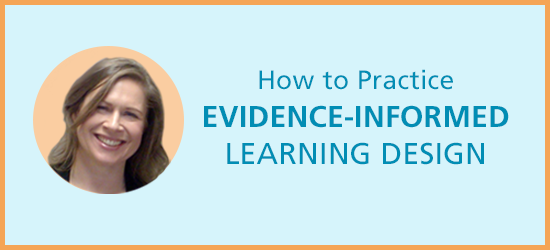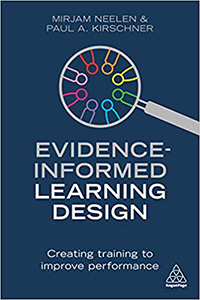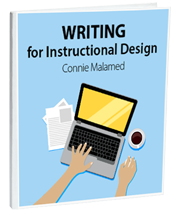
Podcast: Play in new window | Download
Subscribe: Spotify | Podchaser | Email | iTunes
 I am hoping that this will be the decade of maturation for the learning industry. Part of that maturation will involve applying evidence informed learning design drawn from cognitive psychology research. In this episode, I speak with Mirjam Neelen about the conclusions that learning researchers agree on, how to identify learning myths and how to incorporate evidence informed learning strategies into your work.
I am hoping that this will be the decade of maturation for the learning industry. Part of that maturation will involve applying evidence informed learning design drawn from cognitive psychology research. In this episode, I speak with Mirjam Neelen about the conclusions that learning researchers agree on, how to identify learning myths and how to incorporate evidence informed learning strategies into your work.
Mirjam is a coauthor of Evidence-Informed Learning Design: Creating training to improve performance. She is a learning advisory manager with over 10 years of industry experience. In her current role, she leads learning experience design processes across Accenture’s various business entities globally.
WE DISCUSS:
- Difference between evidence-informed and evidence-based learning desig
- Disciplines that feed into the learning sciences
- Learning principles that cognitive researchers agree on
- Value of reflection in learning
- Differentiating between learning myths and research-based findings
- Why we should beware of applying neuroscience findings to learning experience design
- Effective strategies for direct instruction and feedback
- Effective strategies for worked examples, which are underused in workplace training
RATE: Rate this podcast in iTunes
TIME: 26 minutes
TRANSCRIPT: Download the ELC060 Transcript
RESOURCES:
- Evidence-Informed Learning Design (book) by Mirjam Neelen and Paul A. Kirschner
- 3-Star Learning Experiences: (blog) Articles written by Mirjam Neelen and Paul A. Kirschner
- ELC 045: The Art and Science of Practice and Feedback with Patti Shank
- Measured Approach or Magical Elixir? How to Tell Good Science from Bad by Willingham


Agree. Sometimes you will be able to collaborate with your SME in this capacity. Other times, they are not interested in the project at all or are too busy to get very involved.
Question:
Does Evidence-Informed Learning Design not open the door for the ID/teacher as artist who is using his imtuition and creates the pygmalion in the classroom (kie in the science based discussion)
Remark:
Snippet from your nice conversation:
…..Mirjam:Yes. In my experience I thought it was really intriguing, as in, at first they had a tendency to go, “Well, and then I just did this and then you just do that,” but then when they got the hang of what it means to create a worked example, they got really enthusiastic and they started to create all kinds of materials and say, “Oh but then we need this as well and that as well.” And you end up with a very rich suite of, a wide variety of learning materials that you can use not just as the worked example but in various other ways as well.
Connie:Isn’t that interesting? I think a lot of people have not had that experience.
Mirjam:Maybe I’m just lucky. I don’t know.
Remark: No Miriam and Connie, that is just the point: When the ID does the design work after interviewing the SME and comes back with the result, you miss this rich opportunity. If you activate and involve the SME in the way you just did here, they come up with fine examples they wish to improve when you as ID/coach look at it together as you showed in this great description: So find for this SME-bricolage process tools without big manuals that can help the SME to do part of the work. (As ID you coach the SME and do the more complex part of the ID work)
There’s a lot we can adapt and learn from K-12 and Higher Ed and vice versa!
Connie
Worked example is definitely of great value, and I think mimicking academic learning of following the worked examples with excercises/assignments is one thing that we lack in corporate learning.
As always, a great podcast with some key takeaways. Thanks.